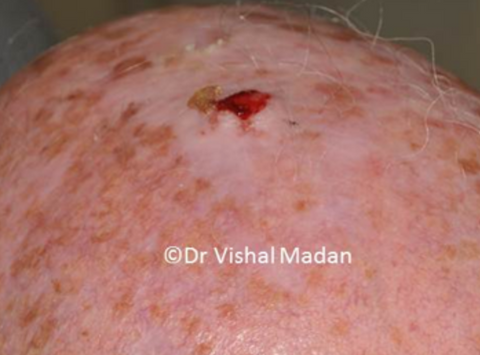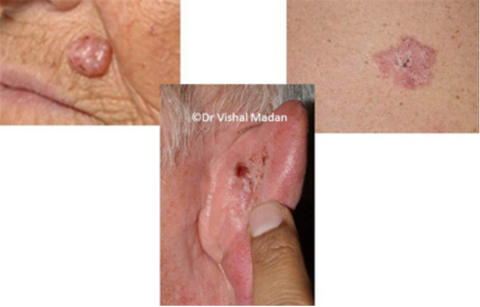Skin Cancer

Any suspicious skin lesion needs to be examined by a doctor who is knowledgeable in making the diagnosis.
The three most common types of skin cancer are:
- Basal cell carcinoma
- Squamous cell carcinoma
- Melanoma
The first principle treatment of skin cancers is appropriate and early diagnosis as early diagnosis leads to early intervention and better prognosis.
For those who have only a few moles and low risk of melanoma (no personal or family history of melanoma, no history of sun bed use or excessive sun exposure, dark skin) a self-skin examination once every few months would suffice.
On the other hand, patients who have the atypical naevus syndrome, previous history of skin cancer/s, strong family history of skin cancers, fair skin, suppressed immunity or history of excessive sun exposure, I would recommend once monthly self-skin examination.
Good quality digital pictures of the moles should be taken at baseline. How do you differentiate an innocent mole from one which is melanoma?
The popular ‘ABCDE’ method comes in handy when assessing moles against baseline photos.
A= Asymmetric. Each one half of the mole differs from the other.
B= Border. A mole with uneven or notched border.
C= Colour. A mole with different shades of grey, black, brown, red, white or blue.
D= Diameter. A mole which is 6 mm or more in its diameter.
E= Evolution.
A mole which appears larger than the baseline pictures.
I also add an ‘F’ to this mnemonic.
F= Funny symptoms of itching, bleeding, crusting and discomfort in a mole are unusual and should never be disregarded.
If you have any of the alarming signs, you should seek advice from your GP who can refer you to a dermatologist. Any suspicious mole should be examined by a dermatologist who would undertake a full-body skin examination and a dermatoscopic examination of the moles to look for signs of melanoma.
Professor Madan uses hand held illuminated magnifiers — dermatoscopes which highlight specific signs of melanoma which may not be apparent to the untrained eyes.
Professor Madan can offer fast track appointments to ensure immediate diagnosis and treatment of skin cancers.
Madan V, Lear JT, Szeimies RM. Non-melanoma skin cancer. Lancet. 2010 Feb 20;375(9715):673-85.


